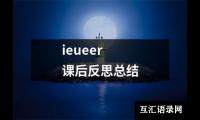小编给大家分享关于高考英语重点语法梳理总结(通用15篇)的范文,文章可能有点长,但是希望大家可以阅读完,增长自己的知识,最重要的是希望对各位有所帮助,可以解决了您的问题,不要忘了收藏本站喔。。 - 素材来源网络 编辑:李欢欢。
以下是小编帮大家整理的高考英语重点语法梳理总结,本文共15篇,仅供参考,大家一起来看看吧。

篇1:高三英语重点语法知识点总结梳理
倒装结构
学生容易混淆的是全部倒装与部分倒装.如何区分之,编个顺口溜:副(adv.)介(prep.)提前全倒装,其它句式部分倒;否定提前倒助动,让步状语倒表语;复合句式倒主句,不
倒装的属特殊.下面举例说明:
A、Here comes the bus.(副词提前,全倒装)
B、Here he comes.(代词作主语,不倒装)
C、In front of the house lies a garden.(介词短语提前,全倒装)
D、Never shall I do this again.(否定词提前,部分倒装)
E、Young as he is ,he knows a lot.(让步状语从句,表语倒装)
F、Only when he told me did I realize what trouble he was in.(only修饰状语,主句倒装)
G、Only he can save the patient.(only修饰主语.不倒装)
H、Not only will help be given to people,but also medical treatment will be provided.(否定词提前,部分倒装)
I、Not only he but also we like sports.(连接两个主语,不倒装)
五、虚拟语气
虚拟语气也是一个难点.所谓虚拟语气是表示说话人的愿望、假设、猜测或建议,而不表示客观存在的事实.它通过句子的谓语动词的特殊形式来表示.现归纳如下:纯假设,用虚拟,动词时态退一级:条件句,分主从,主句谓语前加would (should,could,might);表愿望,用虚拟,wish后面接宾语(从句):现在过去与将来,动词时态退一级:提建议,用虚拟,宾语(从句)动词用(should)do:俩建议,三要求,再加坚持与命令(suggest,advise,demand,require,request,insist,order):It is time和eoukd rather,后接丛句用虚拟:部分主语从句中,谓语用虚拟结构(It is necessry /important/natural/natural/strange/strange that……should do).下面举例说明:
A、If you came tomorrow,we would have the metting. (条件句虚拟)
B、Without air,there would be no living things.(同上)
C、We wish we had arrived there two hours earlier.(表示愿望虚拟)
D、He demanded that we (should)start right away.(表示建议虚拟)
E、It is(high)time that we left (should leave)now.(特殊从句虚拟)
F、I would rather you gave me the book.(同上)
G、It is necessary that we should clean the room everyday,(主语从句虚拟)
H、He speaks English so fluently as if he were English. (特殊从句虚拟)
篇2:高三英语重点语法知识点总结梳理
一、状语从句的一些引导词需要着重注意
1.before: …before I could say a word./It may be some time before the situation improves How long it’ll be before I can go back to work? 2.when: It was six o’clock when they arrived at the hotel. 3.since: It’s three years since I smoked. 4.as: Great as the difficulty was,../Much as I admire,…
5.where: They notice that plants don’t grow well where there is much shade. My doctor advised me to live where the air is fresher. 6.主将从现:
I can when my headache disappear thoroughly. If you go, so will I.
二、时态和语态是很重要的考点
have been painting all day/be always doing/I did lock it/will still be sleeping/will have left The papers are still being corrected/It is being served in the dining room.
三、注意情态动词对过去表示推测的用法
比如,couldn’t have done/might have done/needn’t have done/should/ought to have done特别是shall的用法: No student shall go out of school without the teacher’s permission. Tell him that he shall have the wonderful book tomorrow afternoon. It is the rule that every driver shall obey in this city. Shall I/he book a table?请别忽视某些情态动词的特殊含义,如:
must : If you must know her name, her name is Mabel. would: When I was young, I would sit under the old tree listening to grandpa tell me stories. should: It’s strange that Tom, the most excellent student in our grade should fail in the exam. may: May you succeed!/May you be happy!
篇3:高三英语重点语法知识点总结梳理
Ⅰ.单句语法填空
1.To warm himself,the sailor sat in front of the fire rubbing one bare foot against the__other__.
解析:此处表示“另一只赤着的脚”,指“两者中另外一只”,用the other。句意:为了暖和自己,那个海员坐在火堆前,赤着的一只脚在摩擦另外一只。
2.How would you like __it__ if you were watching your favorite TV program and someone came into the room and just shut it off without asking you?
解析:it作形式宾语,指代后面的if从句。
3.The research group produced two reports based on the survey,but xneitherxcontained any useful suggestions.
解析:neither表示“两者都不”。句意:这个研究小组根据调查做了两个报告,但是没有一个含有任何有用的建议。
4.They reached the top successfully, but on xtheir/thex way back conditions were very difficult.
解析:句意为:他们成功登顶,但是在返程的路上却困难重重。名词前需限定词,根据句意可知,此处填形容词性物主代词their与主语保持一致。也可填定冠词the。
5.They are calmer and__their__(they)mood improves.
解析:修饰名词“mood”要用形容词性物主代词,故用their。
6.She remembered how difficultxitxwas to choose a suitable Christmas present for her father.
解析:it指代不定式to choose a suitable Christmas present for her father。
7.When parents bring home a pet, their child gladly bathes xitx and brushes its fur.
解析:句意为:当父母把一个宠物带回家时,他们的孩子高兴地给它洗澡并刷毛。根据句意可知,it指代上文中的`a pet。
8.Some people take great pleasure in helping and giving to someone else while__others__feel happy doing the opposite.
解析:some...others...有的……;有的……。
9.It's an either-or situation—we can buy a new car this year or we can go on holiday but we can't do__both__.
解析:not...both“并非两者都”,为部分否定。
10.I've lived in New York and Chicago, but don't like __either__ of them very much.
解析:句意:我在纽约和芝加哥住过,但是这两个地方我都不是很喜欢。either“两者中的任何一个”。
11.Recycling is one way to protect the environment; reusing is __another__.
解析:句意:循环利用是保护环境的一种方法,再次使用是另一种。another“另一,又一”。
12.To her joy, Della earned first the trust of her students and then __that__of her colleagues.
解析:根据“先赢得了学生的信任,然后赢得了同事的信任”可知,此处用于替代不可数名词trust,并且特指,应用that;如果替代可数名词复数并特指用those或the ones。
13.At our factory there are a few machines similar to__those__described in this magazine.
解析:考查用于比较对象替代的代词。比较对象的替代通常可以用that替代不可数名词,those替代可数名词复数,故此处用those替代比较对象machines。
14.Cultural shock is a feeling which most travelers experience in a foreign country where they find the culture is quite different from that of x theirx own.
解析:句意为:文化冲击是一种大多数旅游者在外国会经历的感受,他们会发现当地文化与自己的文化大不相同。根据句意可知此处指旅行者自己的文化。of one's own为固定搭配,故填their。
15.I had to raise my voice to make __myself__ heard in the noisy crowd.
解析:句意为:在嘈杂的人群里,我不得不提高声音使自己被听见。make myself heard意为“使我自己被听到”。
篇4:高三英语重点语法知识点总结梳理
英语中过去分词可作宾补,(此时的过去分词一般是及物动词)表被动意义或完成意义,有时两者兼而有之。做宾补的过去分词与宾语有逻辑上的动宾关系,即宾语是过去分词动作的对象。如:
She found the door broken in when she came back.(宾补与宾语有被动的关系,表一种状态。)
一、过去分词用在表状态的动词keep,leave等的后面。
Eg:They kept the door locked for a long time.
Keep your mouth shut and your eyes open.(谚语:少说多看)
Don't leave such an important thing undone.
Don't leave the windows broken like this all the time.
二、过分词用在get,have,make,的后面。
1.注意“have +宾语+过去分词”的两种情况:
A)表“让某人做某事/让某事(被人)做”
eg: I have had my bike repaired.
The villagers had many trees planted just then.
B)表“遭遇到某种不幸,受到打击/受....影响,蒙受.....损失”
Eg:I had my wallet stolen on a bus last month.
The old man had his leg broken in the accident.
He had his leg broken in the match yesterday.(MET1986)
2.“make+宾语+过去分词”,在这种结构中,过去分词的动词必须是表示结果含义的。如:
They managed to make themselves understood in very simple English.
I raised my voice to make myself heard.
三、过去分词用在感观动词watch,notice,see,hear,listen to ,feel,find等后面。如
When we got to school,we saw the door locked.
We can hear the windows beaten by the heavy rain drops.
He felt himself cheated.
The managers discussed the plan that they would like to see carried out the next year.(NMET20xx)
四、过去分词用在want,wish,like ,expect等表示“希望,愿望”这一类动词后面做宾补。如
The boss wouldn't like the problem discussed at the moment.
I would like my house painted white.
I want the suit made to his own measure.
I wish the problem settled.
篇5:高三英语重点语法知识点总结梳理
只用that不用which的情况
1、.先行词为all , much, everything, nothing , something ,anything, nothing, none, the one等不定代词时
2、先行词被only, any, few, little, no , all, just , very ,right等修饰时.
3、当先行词是级或被形容词级修饰时。
4、当先行词是序数词或被序数词修饰时。
5、当先行词是数词时.
6、当先行词既指人又指物时。
7、如有两个定语从句,其中一个关系代词已用which,另一个关系代词则宜用that。
8、主句是There be结构,修饰其主语的定语从句宜用that作关系代词。
9、被修饰成分为表语,或者关系代词本身是定语从句的表语时,该关系代词宜用that。
10、先行词为what,关系代词用that。
11、有时为了避免重复而使用that引导定语从句。
只用which不用that的情况
1、当介词放在关系代词之前时。
2、在非限制性定语从句中。
3、当关系代词指整个主句的概念时。
只用who不用that的情况
1、当先行词是one, ones,anyone或those时。
2、there be结构中。
3、当先行词是人,后面有较长修饰语时。
4、为了避免重复或引起歧义。
5、当先行词是I,you,he,they等时(常用于谚语中)。
6、先行词是指成员的集体名词。
7、who可以引导非限制性定语从句。
8、先行词是拟人化的名词。
9、先行词指特定的人时用who,不指特定的人用that。
关系副词引导的定语从句
1、when时间状语
注意:It/Ihis/That + be + the first/ second/ last time that…只能用that,that可以省略,从句用相应的完成时。
2、where地点状语
注意:当先行词为模糊的地点时,如point. Situation, case, position, stage, scene, spot, activity, family, job等名词时用where.
3、why原因状语先行词为reason。
篇6:高三英语重点语法知识点梳理精选
虚拟语气
I?虚拟语气在if?引导的条件句中的易错点。?
①?if?my?lawyer?had?been?here?last?Saturday,?he?would?have?prevented?me?from?going.?
②?if?you?had?studied?hard?at?school,?you?would?be?a?college?student?now.?
句子①②都是虚拟语气在条件句中的使用,从句中都是假设过去的情况,所以用过去完成时,但在主句中,句①依然指代过去的情况,谓语动词是would?have?done,而②中含有一个表示现在的时间状语now,?这样就必须将其理解为假设现在的情况,所以谓语动词必须为would/should/might+动词原形,学生在这一点上经常会忽略now的存在,从而按句①的形式填写答案。??
Ⅱ虚拟语气在名词性从句中的用法??
1.在it?is?important?(strange,?natural,?necessary……)+that?句子或者It?is?decided?(ordered,suggested,?demanded,?advised……)+that句子中,主语从句中的谓语动词常用(should)+动词原形结构,表示某事“重要”、“必要”、“被决定”等?
例如:①?it?is?important?that?everyone?(should?)?obey?the?rules?all?day?and?all?night.?
②?it?is?decided?that?the?meeting?(should)?be?held?tomorrow?afternoon.?
2.?suggest,?insist?后面指宾语从句时需注意的地方??
1)①suggest?当“建议”“提出”讲时,其后宾语从句的谓语动词常用“should+动词原形”?例如:He?suggested?that?the?work?(should)?be?started?at?once?他建议立即动工。?
类似的动词还有insist坚持,demand要求,desire要求、请求,request请求,require要求、需要,order命令,propose建议,command命令,ask要求,advise建议,prefer宁愿等。?这些动词变被动语态(如:It?is?suggested?+?that主语从句)形式后,主语从句谓语动词仍用“(should)+动词原形”?这些动词变名词(如suggestion)后,其后的表语从句和同位语从句中的谓语部分仍用“(should)+动词原形”?
②suggest?当“提出(某看法),暗示,启发”讲时,其后宾语从句的动词不用虚拟语气。?例如:(1)The?police?suggested?that?the?thief?might?be?one?of?the?family?member?
警察局提出窃贼可能是一名家庭成员。?
(2)Her?yawns?suggests?that?she?is?sleepy.?她打哈欠表明她困了。?
(3)Although?he?didn’t?suggest?that?we?__?the?decision?to?swim?across?the?river,?but?his?look?suggested?that?our?decision?__wrong.虽然他没提出我们应该终止游过这条河的决定,但他的表情表明我们的决定是错误的。?
A:stop;?wasB:?should?stop;?be
C:?stopped?;wasD:?stopped;?should?be?
在这个句子中,前一个suggest当“建议”“提出”讲,而后一个作“表明”讲,所以答案为“A”??
2)①insist作“坚决要求…该…;坚持认为…定要…”讲时,其后宾语从句的谓语动词用“(should)+动词原形”?
例如:I?insisted?that?you?(should)?be?there?on?time.我坚持认为你应该准时到那里去?
②insist?作“坚持(意见,看法);坚持说,确信”讲时,其后从句不用虚拟语气。
例如:He?suggested?(that)?he?heard?someone?in?the?next?room.?他坚持说他听到隔壁屋子里有人。???
篇7:高三英语重点语法知识点梳理精选
非谓语:(to do/ doing / done) (By Yuan)
1.To do(to be done) / doing / done 作状语的区别:
To do(to be done):作目的状语,结果状语(特定句型)
Doing(being done, having done )/done: 作伴随、时间、原因、让步、结果状语等。
1) complete the task ahead of time, they kept working throughout the night.
2) The spy broke into the bank, only find two policemen waiting for him with a gun.
3) He hurried back home, leave piles of work unfinished.
4) Defeat time and again, he still didn’t lose heart.
(分析:1)To/ In order to complete 目的 2)only to find 后接to do 形式,表示一种未预料的结果3)leaving 结果 4) Defeated让步)
2.To do(to be done) / doing / done 作定语的区别:
To do(to be done):多表示未完成的动作,和某些特定句型
doing :(being done):表示正在进行和经常性的动作
done :被动,完成的动作和经常性的动作
1)The commander gave an order attack the enemy before dawn.
2)Who were the first people reach American continent.
3)People live in this area feed on rice.
4)Areas strike by a hurricane are usually in a mess before things return to normal.
(分析:1)to attack 未完成 2)to reach特定句型first/ second等序数词之后 3)living 主动经常性 4) struck/ stricken被动、经常性)
3.To do/to be done 与 to have done / to have been done: 后者表示动作发生在主动词之前。
1) At the moment they are preparing for the concert hold in a fortnight time.
2) The novel is reported translate into German already.
3) He wished praise at the meeting held the day before.
4) I am glad____________(meet) you. I hope to see you soon.
(分析:1)to be held 2) to have been translated 3) to have been praised 4) to have met )
4.doing / being done / having done 与 done
doing :主动、进行或经常性的动作、状态 being done:被动、进行或经常性
having done:主动,完成于主动词之前
done:被动,完成的动作、或经常性的动作、状态
1)When heat , ice will turn into water.
2)While wander in the street, he came across an old friend of his.
3)The manager spoke at the conference, ___express his satisfaction with the project.
4)______wipe the table, the waitress asked the couple to be seated.
5)______raise geese for years, he became an expert at keeping geese.
6)The book _____ publish last month is on grammar.
7)The project _____ carry out these days is to be completed by the end of this year.
(分析: 1) heated 2) wandering 3) expressing 4) Having wiped 5) Having raised 6)published 7) being carried out )
5. 下列动词后只能接动名词(-ing):suggest, finish, avoid, stop, can’t help, mind, enjoy, require, practise, miss, escape, pardon, advise, consider, imagine, keep, appreciate, escape, permit。
篇8:高三英语重点语法知识点梳理精选
一、that 从句
1、主语从句
(1)that从句作主语时,常用it作形式主语,常见的句型有:
It+be+形容词(obvious, true, natural, surprising,good,wonderful,funny,possible,likely,certain,probable,etc.)+that从句
It+be+名词词组(no wonder, an honor, a good thing, a pity, no surprise, etc.)+that从句
It+be+过去分词(said, reported, thought, expected, decided, announced, arranged, etc.)+that从句
(2)that可以省略,但that从句位于句首时,that不能省略。
2、宾语从句
(1)常见的可以接that从句作宾语的动词有see, say, know, imagine, discover, believe, tell, show, think, consider, be sure, be afraid等。在可以接复合宾语的动词之后,如think, make, consider等,可以用it作形式宾语。
(2)That从句一般不能充当介词宾语,偶尔可作except, in 的宾语。
3、表语从句(that不可省略)
4、同位语从句
连词that引导同位语从句时,应在某些抽象名词之后,如:fact, hope, desire, thought, suggestion, idea, news, problem, possibility等,对前面的名词起补充说明的作用,that在从句中不担当任何成分,不能省略。
二、whether/if从句
1、在表语从句和同位语从句中只能用whether不能用if;当主语从句放于句首时,只能用whether不用if;当it作形式主语,主语从句放在句末时用whether或if均可;discuss后引导宾语从句时,必须用whether。
2、在宾语从句中:
(1)及物动词后:whether从句中不能有否定式,宾语从句为否定句时用if;if不能与or not连用,但可以用whether or not;whether后可以加不定式。
(2)介词后:只能用whether,不用if。
篇9:高三英语重点语法知识点梳理精选
含有状语从句、名词性从句和定语从句的复合句
用or, and, so, if 填空
1.One more week, _______ we will accomplish the task.(If we are given one more week, we will accomplish… )
2.Follow your doctor’s advice, ________ your cough will get worse.(If you follow your doctors advice, your…)
3.The WTO can not live up to its name ______it does not include a country that is home to one fifth of mankind.
归纳: 常用于表示并列的连词有:and, not only…but also, neither…nor, so, on one hand…on the other hand等连接两个并列分句表示两个同等概念 (Keys: 1 and 2 or 3 if )
用but, and, so , when, since, while, as 填空
1. I do every single bit of housework _____ my husband Bob just does the dishes now and then.
2. ---I think George doesn’t really care for TV plays.
---Right, ______ he still watches the program.
3. What he said is strange, ________ yet it is true.
1. while 2. but 3. and
归纳:常用于表示转折的连词有:but, still, however, and yet, while, when等。连接两个意义相反的并列分句,表示转折。这些次的用法区别是:but连接并列分句,不用逗号搁开,注意不能将although(though)与but 同时使用;however常用于句首、句中,用逗号搁开;yet构成and yet, 等。
篇10:高三英语重点语法知识点梳理精选
1.The boss of the company is trying to create an easy atmosphere __where__his employees enjoy their work.
解析:本句中定语从句“his employees enjoy their work”不缺主宾表,先行词为atmosphere,表示“气氛,氛围”。将“in+先行词atmosphere”还原回从句中成立,因此答案为where。
2.As the smallest child of his family,Alex is always longing for the time __when__he should be able to be independent.
解析:分析结构可知,此处是定语从句,先行词为time。定语从句为空格后句子,缺少时间状语,用when引导。句意:作为家里最小的孩子,亚历克斯总是渴望他应该能独立的时候。
3. Some experts think reading is the fundamental skill upon __which__ school education depends.
解析:本句为定语从句。引导词在定语从句中位于介词upon的后面作宾语,故用关系代词且指代先行词the fundamental skill,因此用which。
4.It is a truly delightful place, __which__ looks the same as it must have done 100 years ago with its winding streets and pretty cottages.
解析:此句是一个非限制性定语从句,先行词是place,定语从句中缺主语,故用关系代词which。句意:这真是一个宜人的地方,这里蜿蜒的小路和美丽的小村庄一定和1前看起来是一模一样的。
5.The books on the desk,__whose__covers are shiny,are prizes for us.
解析:此句是非限制性定语从句,先行词为the books,________和covers之间存在所有关系,意为“书的封面”。句意:桌上的书是给我们的奖励,那些书的封面闪闪发光。根据语境填whose。
6.He wrote many children's books,nearly half of __which__ were published in the 1990s.
解析:此句为非限制性定语从句,先行词是children's books,定语从句中of缺少宾语,故填which。句意:他写了许多儿童书籍,差不多一半左右是在20世纪90年代出版的。
7.Nowadays,school violence is a hot issue. I think this is a phenomenon,__which__calls for our great concern.
解析:句意:目前,学校暴力是个热点问题。我认为这是一个需要我们极大的关注的现象。从句子结构分析可以看出,空白后面句子是一个非限制性定语从句,对前面句子进行补充说明。
篇11:高考英语重点知识点梳理
1. access to 接近,进入(某地的)方法; 通路
The only access to that building is along that muddy track.
到那栋建筑的通路是沿着那条泥泞的路走。
2. according to 按照,依照,视……而定
The work was done according to his instructions.
那工作是依照他的指示做的。
3. be addicted to 沉溺于……,对……上瘾
He became addicted to the drug.
他上了毒瘾。
4. belong to 属于
This dictionary belongs to me.
这本词典是我的。
5. contribute to 为……做贡献,为……撰稿
Everyone should contribute what he or she can afford to society.
人人都应该尽自己的能力为社会做贡献。
6. devote to 献身,致力于……
He has devoted his life to helping disabled people.
他一生献身于帮助残疾人。
7. due to 因为,由于……而起
His lateness was due to the very heavy traffic on the motorway.
他迟到是因高速公路上车辆过多所致。
8. be equal to 与……相当,有能力胜任……的
Bill is quite equal to running the office.
比尔的能力足以管理这个部门。
9. get close to 靠近,接近
Today many people like to go out to get close to nature.
如今许多人喜欢到户外去接近大自然。
10. get down to 开始做某事,认真处理某事
It’s time I got down to some serious work.
我该认真干点正事了。
篇12:高考英语重点知识点梳理
重要单词用法例析
1. below prep. & adv. 在……下面,低于
Do not write below the line. 不要该横线下写字。
I live on the floor below. 我住在下一层。
2. concentrate vt. & vi. 集中于,专注
I tried my best to concentrate my thoughts on the problem. 我努力让自己集中思想在这个问题上。
3. meanwhile adv. 在此其间,与此同时
The train won’t leave for an hour. Meanwhile we can have lunch. 火车还有一个小时才开,其间我们可以吃中饭。
Tom was at home studying. Meanwhile, Jon was out playing. Tom在家学习,与时同时Jon外出玩耍。
搭配:in the meanwhile同时,在此期间
In the meanwhile I’ll visit an old friend of mine. 在这期间我将去拜访我的一位老朋友。
4. gifted adj. 有天分的; 有天赋的
He is a gifted musician. 他是天才音乐家。
5. seldom adv. 很少
There is seldom snow in Guangdong. 广东很少下雪。
He seldom goes out on Sundays, does he? 星期天他很少出去,对吗?
Seldom has there been such a happy meeting. 过去很少有过这样愉快的会议。
注意:(1)其后的反意疑问句用肯定式;(2)位于句首时,谓语用部分倒装。
篇13:高考英语重点知识点梳理
现在进行时的被动语态
定义:现在进行时的被动语态表示此时此刻某事正在被做。
构成:be + being+过去分词
用法:
1)“be being done” 中的动词be应随主语(sing. / pl.)作相应的变化。
2)将现在进行时的主动语态变为现在进行时的被动语态的关键是:把be doing变为be being done.
现在完成时被动语态可用于哪些场合?
现在完成时被动语态可用来强调发生在过去的被动性动作对现在造成影响。
现在完成时被动语态还可强调到目前为止某被动性动作或状态已存在若干时间。
is/am/are to be done可用于哪些场合?
(1)用来表示根据计划或安排将要发生的被动性动作。
(2)用来表示征求对方意见。
(3)用来表示必要性。
(4)用来表示可能性。
will/shall be done除用于一般将来时构成被动语态外,还可用于什么场合构成被动语态?
will/shall be done除用于一般将来时构成被动语态外,还可用来表示有固定性条件就会有规律性被动结果。
has/have been done是否可用于一般将来时构成被动语态?
可以。has/have been done可用来表示到将来某一时刻为止某一动作已被完成,此时它属于一般将来时被动语态。
现在进行时被动语态结构很复杂,应怎样理解?
现在进行时被动语态结构为:is/am/are being done,is/am/are体现标准对照时间点为现在,并随人称的变化而变化;being体现进行时;being done体现被动语态。
篇14:高二英语重点语法总结
(1)表语从句
1. 定义:用作表语的从句叫做表语从句。
2. 构成:关联词+简单句
3. 引导表语从句的关联词的种类:
(1) 从属连词that。如:
The trouble is that I have lost his address. 麻烦是我把他的地址丢了。
(2) 从属连词whether, as, as if。如:
He looked just as he had looked ten years before. 他看起来还与十年前一样。
The question is whether they will be able to help us. 问题是他们是否能帮我们。
注:从属连词if一般不用来引导表语从句,但as if却可引导表语从句,如:
All this was over twenty years ago, but it's as if it was only yesterday.
这都是20多年前的`事了,但宛如昨天一样。
能跟表语从句的谓语动词一般为系动词be, seem, look等。如:
It looked as if it was going to rain. 看起来天要下雨了。
(3)连接代词who, whom, whose, what, which, whoever, whatever, whichever
连接副词 where, when, how, why。
如:The problem is who we can get to replace her. 问题是我们能找到谁去替换她呢。
The question is how he did it. 问题是他是如何做此事的。
That was what she 高中地理 did this morning on reaching the attic. 那就是她今晨上了阁楼干的。
解释:
1. 连词because可引导表语从句。如:
I think it is because you are doing too much. 我想这是因为你做得太多。
2. 在一些表示“建议、劝说、命令”的名词后面的表语从句中,谓语动词用虚拟语气。should+动词原形表示,should可省略。如:
My suggestion is that we (should) start early tomorrow. 我的建议是我们明天一早就出发。
(2)主语从句
1. 定义:用作主语的从句叫做主语从句。
2. 构成:关联词+简单句
3. 引导主语从句的关联词有三类:
(1) 从属连词that。 如:That they were in truth sisters was clear from the facial resemblance between them.
很明显,她们确是亲姐妹,她们的脸型很相似。
(2) 从属连词whether。如:
Whether he’ll come here isn’t clear. 他是否会来这里还不清楚。
上面为大家提供的高二英语语法总结,是大家学习高二英语语法时必备的手册,它会让你的英语学习变得更简单。
篇15:高一英语重点语法总结
1.because of因为……(注意和because 的区别)
2.even if(=even thoug)即使,用来引导让步状语从句
3.come up走上前来,走近,发生,出现 come up with 追上,赶上,提出
4.communicate with sb和某人交流
5.be different from…与……不同
be different in…在……方面不同
Most of my projects are different in performance.我多数作品的演奏风格都不同。
6.be based on以……为基础
7.at present目前,眼下for the present眼前;暂时
8.make(good/better/full)use of
9.the latter后者 the former前者
10.a large number of大量的 the number of…的数量
11.such as例如
12.hold on坚持住,握住不放;(打电话时)等—会
13.…you will hear the difference in the way(that/in which)people speak.
你会听出人们在说话时的差异。
14.play a role/part(in)在…中担任角色;在…中起作用;扮演一个角色
15.the same…as…与……一样
16.at the top of…在…顶上
at the bottom of在……底部
17.bring up教养,养育;提出
18.request sb(not)to do sth.要求某人做/不要做某事
19.be satisfied with…对……感到满意,满足于
20.suggest v.(request,insist…)
I suggested you do what he says.我建议你按照他说的去做。
I suggest you not go tomorrow.我想你明天还是不要去了。
His pale face suggested that he was in bad health.他苍白的脸色暗示了他身体不好。
注意:insist 意思为“坚持要求”时后面的that从句用虚拟语气;如果insist 意为“强调,坚持认为”的时候,从句可以用任何所需要的时态。例如:She insisted that she didn’t tell a lie.她坚持认为她没撒谎。
21.according to…按照…根据…




